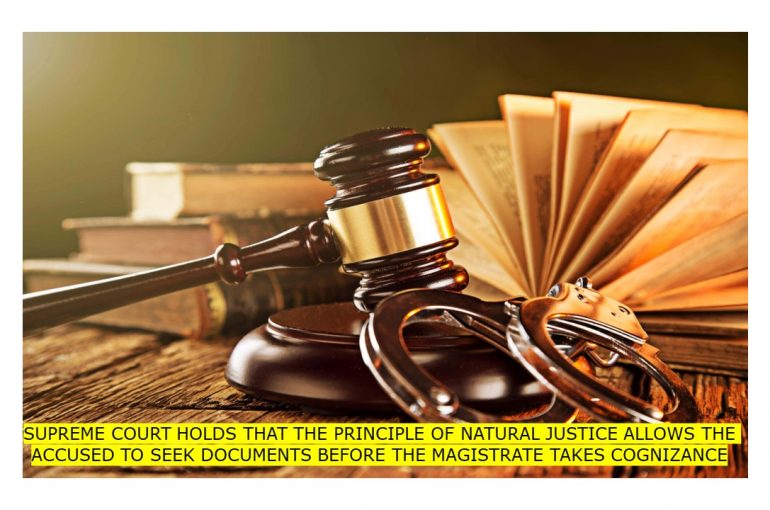SUPREME COURT HOLDS THAT IF PRINCIPLE OF NATURAL JUSTICE ALLOWS THE ACUSSED IS ENTITLED TO SEEK DOCUMENTS BEFORE THE MAGISTRATE TAKES COGNIZANCE
In a recent Criminal Appeal, a three-Judge Bench of the Supreme Court comprising of Chief Justice N.V. Ramana, Justice Krishna Murari and Justice Hima Kohli passed an Order and Judgement dated 20.05.2022 in ‘S.P. Velumani v. Arappor Iyakkam and Ors’ (Criminal Appeal No. 867 of 2022) and set aside the Order and Judgement dated 08.11.2021 (Impugned Order) passed by the Hon’ble High Court of Madras and held that the mandate of Section 207 of CrPC cannot be read as a provision etched in stone to cause serious violation of the rights of the accused as well as to the principles of natural justice.
In this case, the Appellant was a Cabinet-Minister in the State of Tamil Nadu. On 11.09.2018, one Mr. R.S. Bharathi filed a complaint for misuse of powers, with the Directorate of Vigilance and Anti-Corruption. He also filed a criminal petition before the Madras High Court, being Crl.O.P. No. 23428 of 2018. On the very next day, Respondent No.1 filed a complaint before Director, Directorate of Vigilance and Anti-Corruption and SP, Anti-Corruption Bureau, CBI. As no action was forthcoming by the aforesaid Authorities, Respondent No.1 filed a Writ Petition (WP No. 34845 of 2018) before the High Court to constitute a Special Investigation Team (SIT) for the purpose of investigation. Both the Writ Petition and Crl.O.P. No. 23428 of 2018, were tagged and heard together.
When the aforesaid writ petition was listed for the first time before the High Court, the High Court issued notice and directed the respondents therein to file their counter affidavits. On 18.10.2019, the High Court ordered the Director of Vigilance and Anti-Corruption to file a status report on preliminary enquiry. Accordingly, on 01.11.2019, a status report was produced before the High Court. On perusal of the report, the High Court granted time to complete the preliminary enquiry. On 16.12.2019, the Investigating Officer appointed by the High Court completed the preliminary enquiry and submitted a final report to the Director of Vigilance and Anti-Corruption. In view of this, the High Court directed the Director of Vigilance and Anti-Corruption to produce the aforesaid enquiry report in a sealed cover before the next date of hearing. Meanwhile, the State Government of Tamil Nadu made an Application in the Writ Petition contending that as per the report of the Preliminary enquiry, no cognizable offence can be made out. As the matter was pending, there was a change in the political dispensation of the State Government and the Government, while relying upon a Comptroller and Auditor General of India (CAG) report, subsequently recanted from its earlier stand and asked for some time to complete the enquiry.
The Appellant, meanwhile, filed an application in the Writ Petition pending before the High Court, seeking a copy of the Preliminary Enquiry
Report dated 18.12.2019. The High Court vide impugned Order dated 08.11.2021, dismissed the Appellant’s application and disposed of the entire case, giving time to the State Government to investigate the matter.
Aggrieved by the Order of the High Court, the Appellant filed an Appeal before the Hon’ble Supreme Court. The Apex Court observed that it was the High Court which had ordered that a preliminary enquiry be conducted and a report be submitted by the special investigating officer. However, once the enquiry was completed, the High Court failed to even peruse the said report. Rather, the High Court left the decision completely in the hands of the State Government. Such an approach, as adopted by the High Court, cannot be countenanced in law. It was also observed by the Apex Court that the issue which required consideration is whether the Appellant is entitled to the Preliminary Report.
The Supreme Court held that “it is a settled principle that the State cannot blow hot and cold at the same time. When the State Government changed its stand, the High Court neither provided the Appellant an opportunity to defend himself, nor sought a reasoned justification from the State for having turned turtle.” The Court further held that the principles of natural justice demanded that the Appellant be afforded an opportunity to defend his case based on the material that had exonerated him initially, which was originally accepted by the State. The mandate of Section 207 of CrPC that an accused is to be supplied copy of the documents after the Magistrate takes cognizance of the offence cannot be read as a provision etched in stone to cause serious violation of the rights of the appellant-accused as well as to the principles of natural justice.
Thus, the Apex Court directed the High Court to supply a copy of the Preliminary Report to the Appellant and to restore and decide the Writ Petition on merits.
Anuradha Kumari
Associate
The Indian Lawyer & Allied Services
Edited by
Sushila Ram Varma
Chief Consultant and Editor
The Indian Lawyer & Allied Services





































Leave a Reply